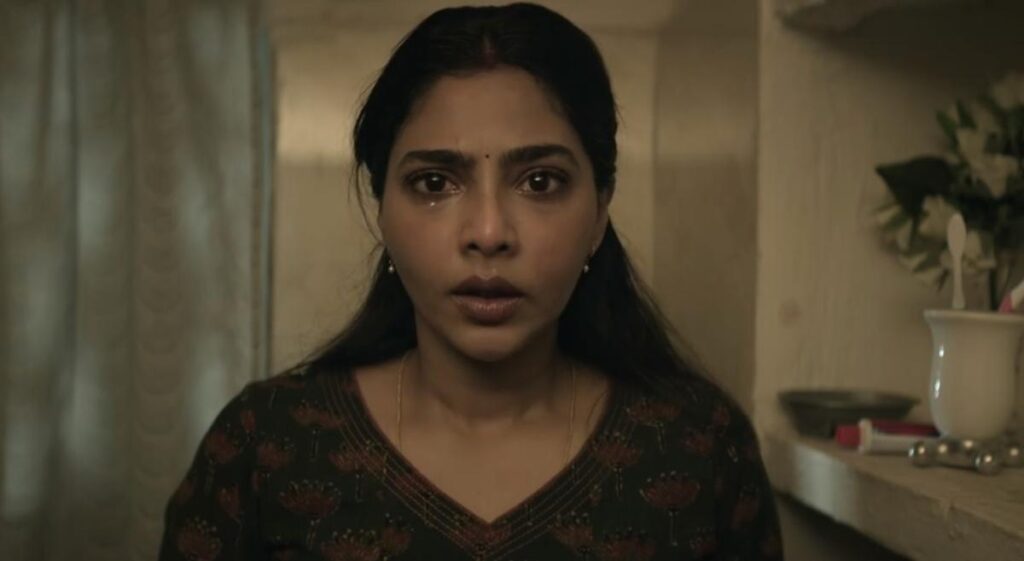In the vibrant world of South Indian cinema, Ammu stands out as a compelling narrative that delves deep into the shadows of toxic masculinity and patriarchal norms. Directed by Charukesh Sekar, this Telugu-language drama thriller, released on Amazon Prime Video in October 2022, offers a raw portrayal of domestic abuse and a woman’s journey to reclaim her life.
Table of Contents
Challenging Societal Norms and Patriarchy
Ammu introduces us to Amudha, affectionately known as Ammu, portrayed by the talented Aishwarya Lekshmi. Her marriage to Ravi, a police inspector played by Naveen Chandra, initially appears idyllic. However, the facade soon crumbles, revealing Ravi‘s descent into abusive behavior—a manifestation of deep-seated patriarchal attitudes and toxic masculinity.
The film doesn’t shy away from depicting the harsh realities many women face in patriarchal societies. Ammu‘s initial silence and endurance reflect the societal pressure on women to maintain familial harmony, even at the cost of personal suffering. Her journey mirrors the experiences of countless women who grapple with the dilemma of speaking out against abuse in environments that often dismiss or stigmatize their plight.
Balancing Complex Relationships and Social Issues
One of the film’s strengths lies in its nuanced portrayal of relationships. Ammu‘s bond with her mother, Kalpana, played by Parvathi T., is particularly poignant. When Ammu confides in her mother about the abuse, Kalpana advises her to follow her instincts, subtly empowering her to make her own decisions. This interaction underscores the importance of familial support in confronting domestic issues.
The introduction of Prabhu, a parolee portrayed by Bobby Simha, adds another layer to the narrative. His subplot runs parallel to Ammu‘s struggles, symbolizing the fight against oppressive forces. Their interactions highlight themes of solidarity and resilience, emphasizing that support can come from unexpected quarters.

A Realistic Depiction of Domestic Abuse
Critics have lauded Ammu for its unflinching portrayal of domestic violence. The film captures the psychological and emotional turmoil of an abuse victim, shedding light on the complexities of such relationships. Ammu‘s transformation from a submissive wife to a woman determined to reclaim her agency is both inspiring and thought-provoking.
The film also critiques societal institutions that often fail victims. Ravi‘s position as a police officer—a figure meant to uphold the law—adds a layer of irony, highlighting the systemic issues that allow abuse to persist. Ammu‘s eventual decision to confront Ravi and seek justice serves as a powerful statement against the normalization of domestic violence.
Hit or Flop: The Verdict on Ammu
Despite its critical acclaim, Ammu had a mixed reception among audiences. While the film was praised for its bold narrative, realistic portrayal of domestic abuse, and stellar performances, its slow-paced storytelling and heavy themes made it a niche watch. Released directly on Amazon Prime Video, it didn’t have a theatrical release to gauge traditional box office success. However, Ammu garnered significant appreciation on streaming platforms, cementing its status as a thought-provoking and impactful film rather than a commercial blockbuster. It remains a cinematic gem for viewers who value meaningful and socially conscious storytelling.
A Call to Action
Ammu is more than just a film; it’s a conversation starter. It urges viewers to reflect on the patriarchal structures that perpetuate toxic masculinity and to support those who challenge these norms. By presenting a realistic depiction of domestic abuse, the film encourages empathy and understanding, fostering a society that stands against such injustices.
In conclusion, Ammu is a significant addition to regional cinema, bravely addressing issues that are often swept under the rug. Its portrayal of a woman’s resilience in the face of oppression is both compelling and inspiring. For those interested in exploring more films that tackle societal issues and offer deep character studies, check out our other articles on impactful South Indian cinema. Read here.






